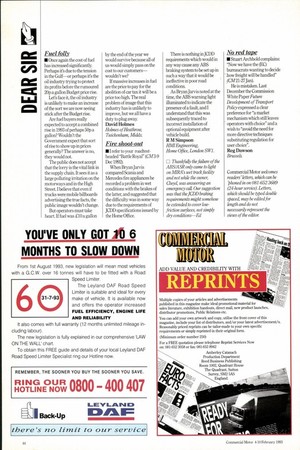Fuel folly • Once again the cost of fuel has
Page 46

If you've noticed an error in this article please click here to report it so we can fix it.
increased significantly. Perhaps it's due to the tension in the Gulf—or perhaps ifs the oil industry trying to protect its profits before the rumoured 20p a gallon Budget price rise.
Fuel folly • Once again the cost of fuel has increased significantly. Perhaps it's due to the tension in the Gulf—or perhaps ifs the oil industry trying to protect its profits before the rumoured 20p a gallon Budget price rise.
Let's face it, the oil industry is unlikely to make an increase of the sort we are now seeing stick after the Budget rise.
Are fuel buyers really expected to accept a combined rise in 1993 of perhaps 50p a gallon? Wouldn't the Government expect that sort of rise to show up in prices generally? The answer is no, they would not.
The public does not accept that the lorry is the vital link in the supply chain. It sees it as a large polluting irritation on the motorways and in the High Street. I believe that even if trucks were mobile billboards advertising the true facts, the public image wouldn't change.
But operators must take heart If fuel was £10 a gallon by the end of the year we would survive because all of us would simply pass on the cost to our customers— wouldn't we?
If massive increases in fuel are the price to pay for the abolition of car tax it will be a price too high. The real problem of image that this industry has is unlikely to improve, but we all have a duty to plug away.
David Holmes Holmes of Heathrow, Twickenham, Middx.
Fire shoot-out • I refer to your roadtestheaded "Battle Royal" (CM3-9 Dec 1992).
When Bryan Jarvis compared Scania and Mercedes fire appliances he recorded a problem in wet conditions with the brakes of the latter, and suggested that the difficulty was in some way due to the requirements of JCDD specifications issued by the Home Office. There is nothing in JCDD requirements which would in any way cause any ABS braking system to be set up in such a way that it would be ineffective in poor road conditions.
As Bryan Jarvis noted at the time, the ABS warning light illuminated to indicate the presence of a fault, and I understand that this was subsequently traced to incorrect installation of optional equipment after vehicle build.
R M Simpson HMI Engineering, Home Office, London SWI.
D Thankfully the failure of the ABS/ASR only came to light on MIRA's wet track facility and not while the owner, Clwyd, was answering an emergency cal Our suggestion was that the JCDD braking requirements might somehow be extended to cover lowfriction surfaces, not simply cfry conditians—Ed No red tape • Stuart Archbold complains: "Now we have the (EC) bureaucrats wanting to decide ° how freight will be handled" (CM21-27 Jan).
He is mistaken. Last December the Commission White Paper Future Development of Transport Policy expressed a clear preference for "a market mechanism which still leaves ° operators with choice" and a wish to "avoid the need for more directive techniques substituting regulation for user choice".
Reg Dawson Brussels Commercial Motor welcomes readers' letters, which can be 'phoned in on 081-6523689 (24-hour service). Letters, which should be typed double spaced, may be edited for length and do not necessarily represent the views of the editor
















































































